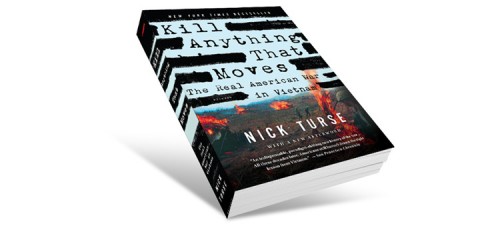
The Collective Asteroid of Human History
Tom Engelhardt
Worlds end. Every day. We all die sooner or later. When you get to my age, it’s a subject that can’t help but be on your mind.
What’s unusual is this: it’s not just increasingly ancient folks like me who should be thinking such thoughts anymore. After all, worlds of a far larger sort end, too. It’s happened before. Ask the dinosaurs after that asteroid hit the Yucatán. Ask the life forms of the Permian era after what may have been the greatest volcanic uproar the planet ever experienced.
According to a recent U.N. global assessment report, up to one million (that’s 1,000,000!) species are now in danger of extinction, thanks largely to human actions. It’s part of what’s come to be called “the sixth extinction,” a term that makes the point all too clearly. Except in our ability to grasp (or avoid grasping) our seeming determination to wipe away this version of the world, we’re in good company. Five great moments of obliteration preceded us on Planet Earth.
And by the way, that impressive figure for endangered species should probably be upgraded to at least one million and one (1,000,001!). As anthropologist Richard Leakey said years ago, “Homo Sapiens might not only be the agent of the sixth extinction, but also risks being one of its victims.” In other words, it’s evidently not enough for us to turn ourselves into the modern equivalent of the asteroid that took down the dinosaurs, ending the Cretaceous period. It looks as if, in some future that seems ever closer, we might be our own asteroid, the one that will collapse human civilization as we’ve known it.

Sidney Gottlieb and the CIA Search for Mind Control
Stephen Kinzer
Years of wandering through distant lands, never knowing who or what lies around the next bend! It is a prospect to stir any adventurous soul. During the second half of the twentieth century, few American souls were as restless as that of Sidney Gottlieb. He spent his career deep inside Washington’s secret world. No one knew what he did, but he seemed to have earned a fulfilling retirement.
A more ordinary man might have been happy to spend his later years relaxing, reminiscing, or playing with grandchildren. Gottlieb, however, was a psychic voyager, far from anyone’s stereotype of the career civil servant. His home was an eco-lodge in the woods with outdoor toilets and a vegetable garden. He meditated, wrote poetry, and raised goats.
Gottlieb was just fifty-four years old when he retired. His career ended well, with a ceremony at which he was awarded a medal for distinguished service. Soon afterward, he and his wife sold their home and almost everything else they owned. In the autumn of 1973 they set off to seek humanitarian adventure and spiritual fulfillment. Their plan was marvelously vague: board a freighter in San Francisco and go wherever it was going. They had little interest in sightseeing or conventional tourism. The Gottliebs wanted to spend their older years serving the world’s neediest people.

How to Seize the Arctic’s Resources, Now Accessible Due to Climate Change (Just Don’t Mention Those Words!)
Michael Klare
Donald Trump got the headlines as usual — but don’t be fooled. It wasn’t Trumpism in action this August, but what we should all now start referring to as the Pompeo Doctrine. Yes, I’m referring to Secretary of State Mike Pompeo and, when it comes to the Arctic region, he has a lot more than buying Greenland on his mind.
In mid-August, as no one is likely to forget, President Trump surprised international observers by expressing an interest in purchasing Greenland, a semi-autonomous region of Denmark. Most commentators viewed the move as just another example of the president’s increasingly erratic behavior. Danish Prime Minister Mette Frederiksen termed the very notion of such a deal “absurd,” leading Trump, in an outburst of pique, to call her comments “nasty” and cancel a long-scheduled state visit to Copenhagen.
A deeper look at that incident and related administration moves, however, suggests quite a different interpretation of what’s going on, with immense significance for the planet and even human civilization. Under the prodding of Mike Pompeo, the White House increasingly views the Arctic as a key arena for future great-power competition, with the ultimate prize being an extraordinary trove of valuable resources, including oil, natural gas, uranium, zinc, iron ore, gold, diamonds, and rare earth minerals. Add in one more factor: though no one in the administration is likely to mention the forbidden term “climate change” or “climate crisis,” they all understand perfectly well that global warming is what’s making such a resource scramble possible.
Leaving a Misguided War and Choosing Not to Look Back
Andrew Bacevich
When the conflict that the Vietnamese refer to as the American War ended in April 1975, I was a U.S. Army captain attending a course at Fort Knox, Kentucky. In those days, the student body at any of our Army’s myriad schools typically included officers from the Army of the Republic of Vietnam (ARVN).
Since ARVN’s founding two decades earlier, the United States had assigned itself the task of professionalizing that fledgling military establishment. Based on a conviction that the standards, methods, and ethos of our armed forces were universally applicable and readily exportable, the attendance of ARVN personnel at such Army schools was believed to contribute to the professionalizing of the South Vietnamese military.
Evidence that the U.S. military’s own professional standards had recently taken a hit — memories of the My Lai massacre were then still fresh — elicited no second thoughts on our part. Association with American officers like me was sure to rub off on our South Vietnamese counterparts in ways that would make them better soldiers. So we professed to believe, even while subjecting that claim to no more scrutiny than we did the question of why most of us had spent a year or more of our lives participating in an obviously misbegotten and misguided war in Indochina.
For serving officers at that time one question in particular remained off-limits (though it had been posed incessantly for years by antiwar protestors in the streets of America): Why Vietnam? Prizing compliance as a precondition for upward mobility, military service rarely encourages critical thinking.

The Living Literature of War
Nick Turse
IThere may be nothing more human than the urge to tell stories. All societies, however ancient, have told themselves tales about how the world and humanity began — and might end. And when it comes to endings, storytelling in just about every imaginable form has never ended. In our time, from the novel to the comic, history books to documentary films, Hollywood’s damnedest to TV shows, social media to the streaming of everything, stories about our lives are a taken-for-granted part of our world.
In a way, almost everything turns out to be a story written in time. The latest dinosaur bone is, for instance, a story of the passage of time itself and of those times before humanity could even begin to tell stories; the mounted body of “Martha,” the last passenger pigeon, which died in the Cincinnati Zoological Gardens in 1914, is still a story (one that, only a few years ago, you could view at the Smithsonian’s National Museum of Natural History in Washington, D.C.); even funerals are, in their own fashion, stories, as was true recently of the “funeral” the government of Iceland held for the first glacier to melt down and disappear from its landscape — a dystopian tale of humanity’s embattled future on this planet.
IAnd speaking about embattled: though it’s something seldom thought about, all-too-human stories can be “written” (or perhaps, the word should be “engraved”) on our bodies as well, tales of the grimmest sort. In fact, as TomDispatch Managing Editor Nick Turse suggests today, it’s time to start considering how combat, that seemingly eternal human activity, transcribes its stories onto the very bodies of those who live through, rather than die in, our wars. Tom
